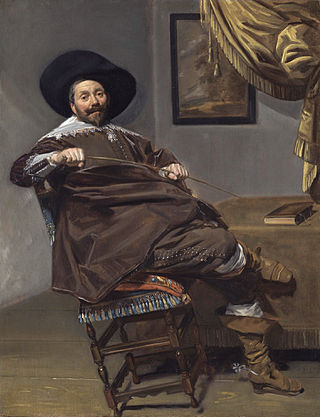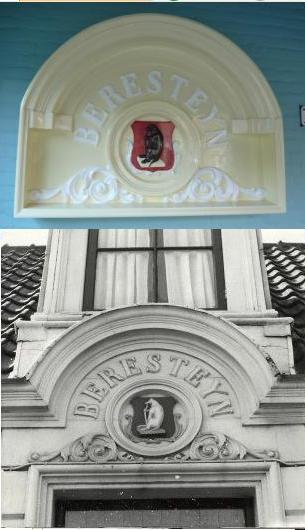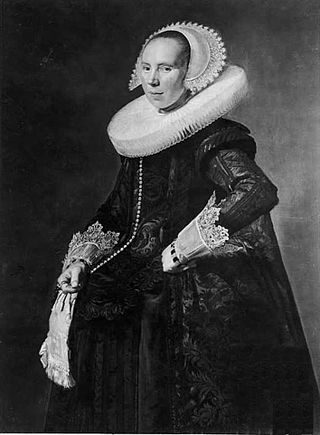
Frans Hals the Elder was a Dutch Golden Age painter, chiefly of individual and group portraits and of genre works, who lived and worked in Haarlem.

The Hofje van Willem Heythuijsen is a hofje in Haarlem, Netherlands. It was founded in 1650 by the testament of Willem van Heythuysen on the site of his summer residence outside the city walls of Haarlem on land that was considered Heemstede property until it was annexed in 1927. It is one of the few hofjes of Haarlem to be built outside the city walls. It has a 'T' shape and has a small open courtyard and a garden still intact.

Willem van Heythuysen, was a Dutch cloth merchant and hofje founder in Haarlem and Weert. He is best known today for his portraits by Frans Hals, though he is remembered locally for his Hofje van Willem Heythuijsen bordering Haarlemmerhout park, which has been in operation for centuries.

The Hofje van Codde en Beresteyn is a hofje in Haarlem, Netherlands. The current building is from 1968 and is located on the J. Cuyperstraat, which is named for the architect who designed the Cathedral of Saint Bavo next door, Joseph Cuypers. This hofje is the wealthiest hofje foundation in Haarlem with the most modern facilities for its inhabitants. Poor (devote) Catholic women of Haarlem 60 years and older are still welcome to live there for free.

Joseph Coymans, was a Dutch businessman in Haarlem, known best today for his portrait painted by Frans Hals, and its pendant, Portrait of Dorothea Berck. The former resides at the Wadsworth Atheneum in Hartford, the latter at the Baltimore Museum of Art. A portrait of the couple's son Willem is held by the National Gallery of Art in Washington, D.C.

Tieleman Roosterman, was a Dutch cloth merchant and friend of Willem van Heythuysen. Roosterman is best remembered today for his portrait painted by Frans Hals.

Isabella Coymans, was the Dutch wife of Stephanus Geraerdts best known for her portrait painted by Frans Hals.

Michiel de Wael, was a Dutch brewer and citizen of Haarlem, best known today for his portraits painted by Frans Hals. His grandfather, also a brewer, was one of the first Calvinists in the city and was involved in the Siege of Haarlem.

Gijsbert Claesz van Campen, was a Dutch cloth merchant of Haarlem who is most famous today for his family portrait painted by Frans Hals. The sitters in this painting have been identified by Pieter Biesboer as the family of Gijsbert Claesz. van Campen and is today split into three parts; the left half is in the collection of the Toledo Museum of Art, with an extra baby lower left added by Salomon de Bray in 1628, the center half is in the collection of the Royal Museums of Fine Arts of Belgium, Brussels, and a third fragment on the far right from a European private collection make up the three known surviving pieces of the original portrait. These three segments were reunited at the Toledo Museum of Art for an exhibition October 18, 2018 – January 6, 2019. The exhibition traveled to the RMFAB in Brussels from February 2 – April 28, 2019 and the Collection Frits Lugt in Paris, from June 8 – August 25, 2019.

Aletta Hanemans (1606–1653), was a Dutch brewer. She became the brewer of the Hoeffijser in Haarlem. She is best known today for her marriage portrait by Frans Hals, painted when she married the brewer, magistrate, and later mayor of Haarlem, Jacob Pietersz Olycan in 1624.

Claes Duyst van Voorhout is an oil-on-canvas portrait painting by the Dutch Golden Age painter Frans Hals, painted in 1638 and now in the Metropolitan Museum of Art, New York City.

Catharina Both van der Eem is a painting by the Dutch Golden Age painter Frans Hals, painted in 1620 and now in Louvre Museum. It is considered a pendant portrait to the Portrait of Paulus van Beresteyn, in the same museum.

Portrait of Cunera van Baersdorp is an oil-on-panel painting by the Dutch Golden Age painter Frans Hals, painted in 1625 and now in a private collection. It is considered a pendant portrait to the Portrait of a Man Standing, now identified as Cunera's husband Michiel de Wael.

The following are pendant portraits by Frans Hals painted on the occasion of a marriage or marriage anniversary. This list is a subset of the list of paintings by Frans Hals, showing the marriage portraits side by side.

Portrait of Cornelia Claesdr. Vooght is a painting by the Dutch Golden Age painter Frans Hals, painted in 1631 and now in the Frans Hals Museum. The painting is an oil on panel and is considered a pendant portrait to that of her husband, the Haarlem brewer and mayor Nicolaes Woutersz van der Meer.

Portrait of Feyntje van Steenkiste is an oil-on-canvas painting by the Dutch Golden Age painter Frans Hals, painted around 1635 and now in the Rijksmuseum, in Amsterdam. It is considered a pendant to the portrait of Feyntje's husband Lucas de Clercq.

Portrait of Maria Pietersdochter Olycan is an oil-on-canvas painting by the Dutch Golden Age painter Frans Hals, painted in 1638, now in the São Paulo Museum of Art. It is considered a pendant to the portrait of Maria's husband Andries van Hoorn.

Portrait of Hylck Boner is an oil-on-canvas painting by the Dutch Golden Age painter Frans Hals, painted in 1635 and now in the Frick Collection. It is considered a pendant to the portrait of Hylck's husband Johannes Saeckma.

Portrait of Mrs. Bodolphe is an oil-on-canvas painting by the Dutch Golden Age painter Frans Hals, painted in 1643 as half of a pair of pendant marriage portraits and is still together with its pendant in the Yale University Art Gallery, New Haven, Connecticut.

Portrait of Stephan Geraedts, Husband of Isabella Coymans is an oil on canvas painting by Dutch Golden Age painter Frans Hals. The painting was originally part of a couple of pendant wedding portraits. Hals probably painted the present portrait, Stephanus Geraerdts', alderman in Haarlem, and the accompanying portrait of the latter's wife Isabella Coymans around 1650–1652, six or seven years after their marriage in 1644. Isabella's portrait is now in a private collection in Paris.






















